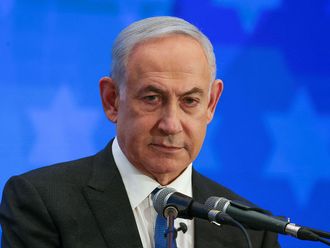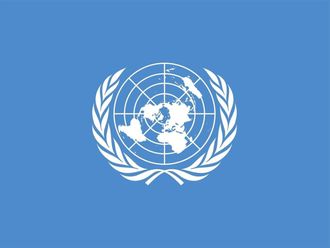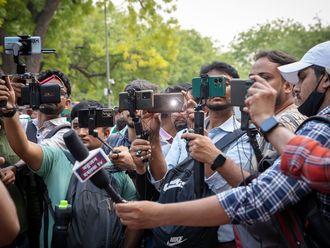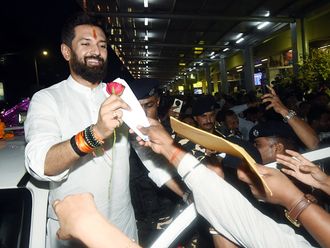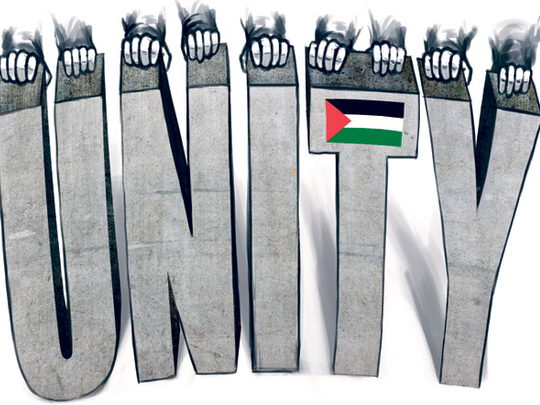
The Sirte Summit which wrapped up in Libya on Sunday was a ‘Palestine Summit' par excellence. Former hot topics such as Darfur, Lebanon and Iraq were all kept on the back burner as Arab leaders turned their attention to what really mattered now: the miserable situation of the Palestinians.
In wrapping up their 22nd summit, Arab leaders stressed that there would be no talks with Israel until there is a full freeze on colonies in occupied Palestine, including occupied East Jerusalem. When and if talks Palestinian talks with the Israelis do continue, they added, they would pick off from where they ended, based on international resolutions and within a specific time frame.
A special summit will be held next September, they said, chaired by Iraq, to follow-up on the Libya Summit. It is unclear, however, whether the September summit will be held in Baghdad, due to security concerns, or at the Arab League headquarters in Cairo. The Arabs also urged the UN Security Council to condemn "Judiasation" of occupied Jerusalem. They toyed with the idea of taking Israel to the International Court of Justice, and called on Unesco to protect Al Aqsa Mosque, given continued Israeli excavations in occupied East Jerusalem. They decided to create a fund for $500 million to "rescue [occupied] Jerusalem" and form a committee to document Israeli confiscation of Palestinian lands and homes in occupied Jerusalem.
Strong words coming out of a high profile gathering of 14 Arab leaders. Whether the Arabs will manage to put their words into action — providing the Palestinians with enough cover to enable them to say ‘no' to the Israelis and the Americans — is yet to be seen between now and next September. Another outcome of the Libya Summit were the strong words spoken by the League's guest, Turkish Prime Minister Recep Tayyip Erdogan, who described Israel's colony policies in occupied Jerusalem as "madness". The rhetoric is neither new to Arab summits, especially since the Palestinian intifada broke out 10 years ago, nor is it new for Erdogan. UN Secretary-General Ban Ki-moon strongly backed the Arabs, describing the colonies as "illegal" while Palestinian National Authority President Mahmoud Abbas referred to what was happening in occupied Jerusalem as "ethnic cleansing".
There is no indicator whatsoever, however, that Israel is about to freeze construction of 1,600 colonist homes that it plans to erect in occupied East Jerusalem, a policy that temporarily strained Tel Aviv's relationship with the Obama White House. Not only did Israeli Prime Minister Benjamin Netanyahu seem undaunted by the Arab resolutions, but he went ahead with restoration of a 17th century synagogue near Al Aqsa Mosque.
Arab media coverage of the summit was surprisingly mediocre, when compared to previous conferences, especially that no surprises were recorded by Libyan leader Muammar Gaddafi. When asked about disillusionment on the Arab street ahead and during the Libya Summit, Arab League Secretary-General Amr Mousa smiled and said, "I don't blame them. Public opinion needs more and needs clear positions". Mousa's words came shortly after the Emir of Qatar, Hamad Bin Khalifa Al Thani said the Arab world was going through "a major crisis that cannot be ignored". He added, "We cannot fool ourselves and fool our peoples or remain helpless against the responsibility of history".
The last time the Arabs came out with thundering resolutions — in favour of a collective peace agreement — in 2002, then Israeli prime minister Ariel Sharon responded by mercilessly invading and raiding Ramallah and tightening the siege of his arch nemesis, Yasser Arafat. Since then, very little has changed in the Arab-Israeli conflict, raising fears that Netanyahu will be as arrogant and wild in responding to the Arabs assembled in Libya. Why? Well one reason is how the Arabs have behaved before, during, and after every one of their memorable summits since 1948.
In October 2000, a summit was held in Cairo where a fund of $1 billion was set aside to preserve Al Aqsa Mosque and support the intifada. Most of that money did not get through to the Palestinians, explaining why many doubt whether the $500 million of 2010 will find their way to the people of occupied Jerusalem. It was not until November 1973 that the Arab summit then decided to "refuse any solution that might be harmful to complete Arab sovereignty over the holy city of [occupied ] Jerusalem" and it was not until October 1974 that the summit affirmed "the right of the Palestinians to self-determination and to return to their homeland". At a 1987 Arab conference in Amman, so tense was the situation between the Arabs and Arafat that the Palestinian cause was absent from the leaders' agenda.
The Arabs have to put a collective and gigantic effort into materialising the resolutions reached in Libya — to prove to the world that gone are the days of George W. Bush when the Arab world was weak and divided. Instead, it must be replaced today by a strong, united, and serious Arab leadership, very different from that of the 1960s and 1970s, dedicated to the Palestinian cause, which it has been describing as its No 1 priority for decades.
Sami Moubayed is editor-in-chief of Forward Magazine in Syria.


